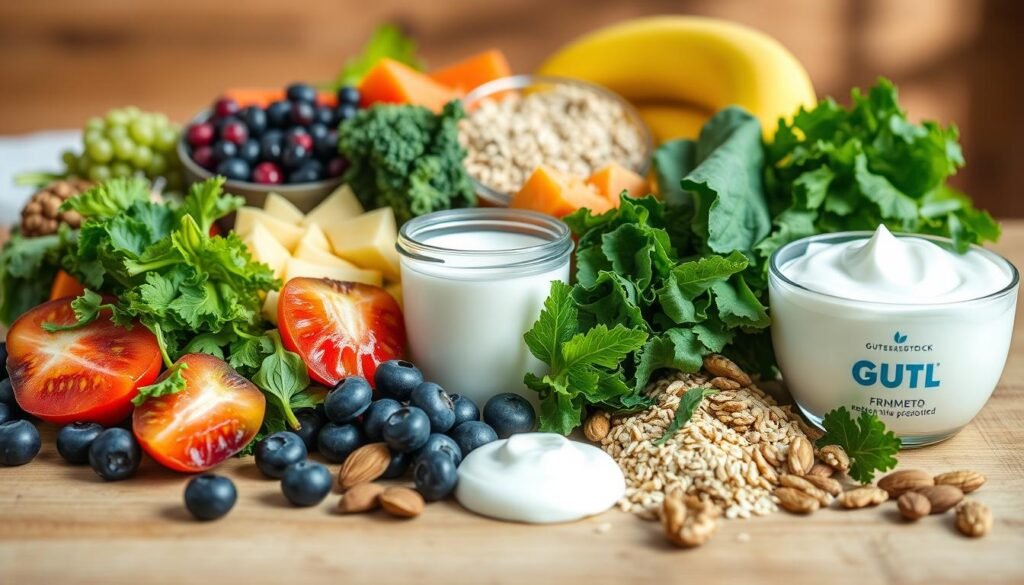
Our journey to better health highlights the importance of gut health. It affects digestion, immunity, and even our mood. This article will show you the top 10 foods for gut health. These foods are full of probiotic foods, prebiotic foods, and nutrients. Adding them to our diet can boost our digestion and balance our gut health.
Key Takeaways
- Gut health is key for overall wellness, affecting digestion, mood, and immunity.
- Healing foods can help balance our microbiome.
- Probiotic foods help grow good bacteria.
- Prebiotic foods feed our gut’s good bacteria.
- A diet rich in fiber, healthy fats, and antioxidants supports digestion.
- Avoiding gut irritants can improve our gut health.
Understanding Gut Health
We often overlook the intricate landscape within our bodies, particularly the gut. This area is home to trillions of microorganisms playing diverse roles in our health. By exploring the importance of gut health, we can appreciate how much it contributes to our overall well-being.
Importance of Gut Health
The gut microbiome comprises a vast array of bacteria that assist in digestion, nutrient absorption, and immune system functioning. Maintaining a balanced gut microbiome is critical. A healthy gut can decrease inflammation, ensure nutrient assimilation, and aid in metabolic processes.
The importance of gut health lies not only in digestion but also in supporting various bodily functions. An imbalanced gut can lead to issues like bloating, irritable bowel syndrome, and even allergies.
How Gut Health Affects Overall Well-being
A strong link exists between gut health and mental wellness, often referred to as the gut-brain axis. Studies suggest that the gut microbiome can influence our mood, anxiety levels, and even cognitive function. By understanding the relationship between gut and brain, we can begin to appreciate how gut health impacts mental clarity, emotional stability, and stress management.
A healthy gut may lead to improved mental health, while disruptions in the gut can correlate with disorders such as depression and anxiety.
| Aspect | Implications |
|---|---|
| Gut Microbiome | Essential for digestion and immune function |
| Inflammation | Healthy gut can reduce systemic inflammation |
| Mental Health | Balanced gut microbiome supports emotional well-being |
| Relationship with Brain | Direct influence on mood and cognition |
The Best Foods to Eat for Gut Health and Healing
Keeping our gut healthy is key to feeling good. Eating the right foods helps balance our gut’s bacteria. This leads to better digestion and nutrient use.
We should eat foods that are good for our gut. These include:
- Fermented Foods: Yogurt, kefir, and sauerkraut are full of probiotics. They help our gut bacteria.
- Prebiotic Foods: Garlic, onions, and bananas feed the good bacteria in our gut.
- High-Fiber Foods: Vegetables, whole grains, and legumes help with digestion and bowel movements.
- Bone Broth: It’s full of nutrients and amino acids. It helps keep our gut lining healthy.
- Healthy Fats: Foods like salmon and flaxseeds reduce inflammation in our gut.
Mixing these foods into our diet helps our gut health. Each food is important for our digestive health. It’s key to make eating these foods a habit.
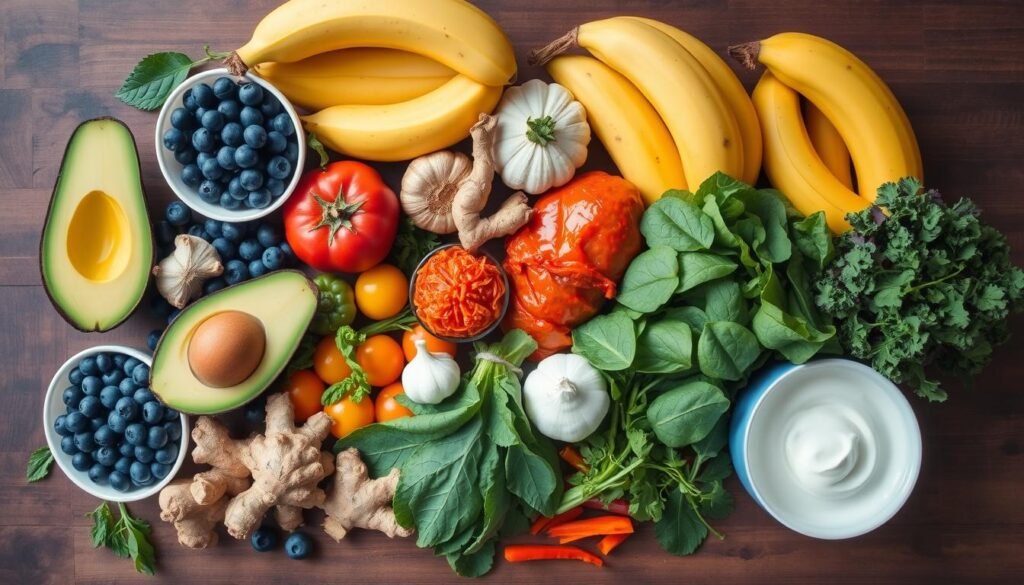
Eating a variety of these foods makes meals tasty. It also strengthens our gut health. This makes us feel better physically and mentally.
| Food Category | Examples | Benefits |
|---|---|---|
| Fermented Foods | Yogurt, Kefir, Sauerkraut | Boosts probiotics and gut health |
| Prebiotic Foods | Garlic, Onions, Bananas | Supports beneficial bacteria growth |
| High-Fiber Foods | Whole Grains, Vegetables, Legumes | Aids digestion and regularity |
| Bone Broth | Homemade Bone Broth | Promotes gut lining health |
| Healthy Fats | Salmon, Flaxseeds | Reduces inflammation |
Fermented Foods: The Probiotic Powerhouses
Fermented foods are key to better gut health. They go through a natural process that makes them more nutritious. This process adds good bacteria, or probiotics, to our diet. Eating a variety of fermented foods helps our gut health a lot.
Overview of Fermented Foods
Fermented foods are tasty and varied. You can find everything from creamy yogurt to tangy sauerkraut. These foods have live cultures that are good for us. The fermentation process makes them easier to digest and boosts their nutritional value.
The Benefits of Probiotics for Gut Health
Probiotics in fermented foods are very beneficial. Eating these foods regularly can help balance our gut bacteria. This balance is crucial for avoiding digestive issues like bloating and constipation. It also boosts our immune system, showing how important gut health is for our overall well-being.
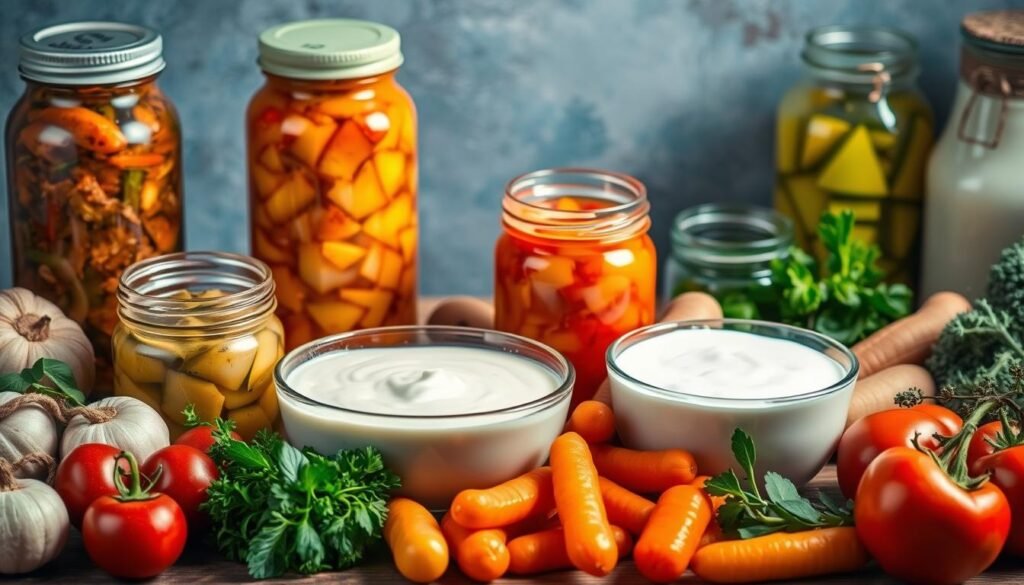
Prebiotic Foods: Fuel for the Good Bacteria
Prebiotics are key to a healthy gut. They feed the good bacteria in our stomachs. Knowing the benefits of prebiotics shows how vital they are for our health.
What Are Prebiotics?
Prebiotics are special fibers that can’t be digested by us. Yet, they’re crucial for the growth of good bacteria in our gut. Adding prebiotic-rich foods to our diet boosts our gut health and immune system.
Top Prebiotic Foods to Include in Your Diet
It’s easy to add prebiotic foods to our meals. Here are some top picks:
- Garlic
- Onions
- Bananas
- Asparagus
- Oatmeal
| Prebiotic Food | Fiber Content (grams per 100g) | Additional Benefits |
|---|---|---|
| Garlic | 9.0 | Rich in antioxidants and improves heart health. |
| Onions | 1.7 | Supports immune function and has anti-inflammatory properties. |
| Bananas | 2.6 | Promotes digestive health and provides natural energy. |
| Asparagus | 2.0 | High in vitamins and minerals, supports bone health. |
| Oatmeal | 10.6 | Helps lower cholesterol and stabilizes blood sugar levels. |
By eating these prebiotic foods regularly, we improve our gut health and overall wellness.
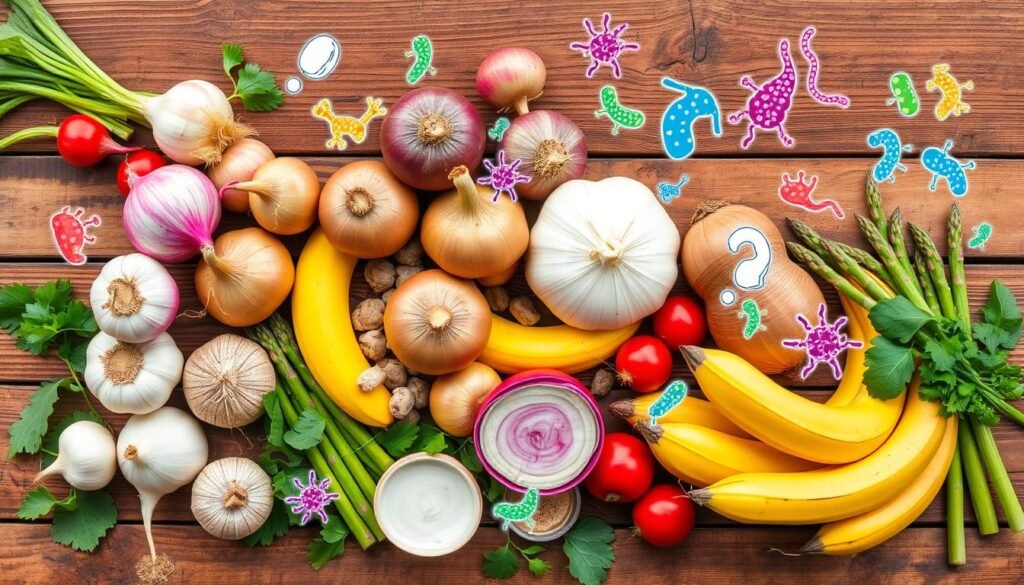
High-Fiber Foods: Enhancing Digestion Naturally
Eating high-fiber foods is key for good digestion. These foods give us the dietary fiber we need. Fiber helps keep our bowel movements regular and prevents constipation.
Benefits of Dietary Fiber
Dietary fiber does more than just help with digestion. It also lowers cholesterol and keeps blood sugar stable. Fiber makes it easier for waste to move through our system. Eating a mix of high-fiber foods boosts our health in many ways.
Incorporating Fiber into Your Meals
There are easy ways to add high-fiber foods to your meals:
- Start your day with oatmeal topped with fruits like bananas or berries.
- Snack on raw vegetables and hummus for a healthy bite.
- Add beans or lentils to salads for added protein and fiber.
- Opt for whole-grain bread instead of white bread for sandwiches.
- Include a variety of fruits, such as apples, oranges, and pears, in your diet.
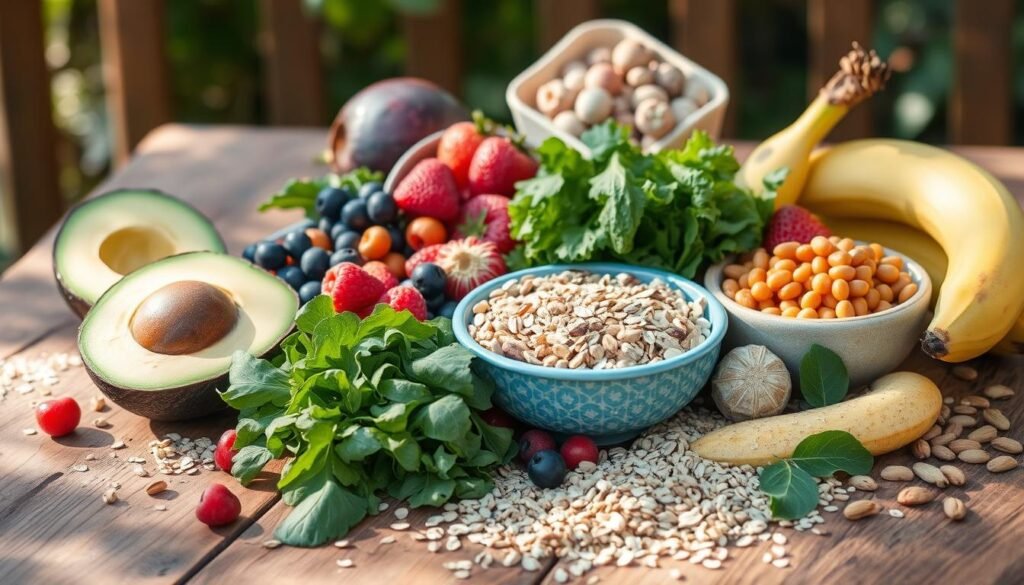
Bone Broth: A Healing Elixir
Bone broth is known for its health benefits, especially for our gut. It’s made by simmering animal bones and connective tissues for a long time. This process extracts nutrients that can improve our health.
What Is Bone Broth?
Bone broth is a liquid full of nutrients. It’s made by cooking bones, cartilage, and sometimes meat. This cooking method softens the bones and releases compounds like collagen and minerals.
These compounds help heal the gut. They make bone broth a powerful health tonic.
How Bone Broth Supports Gut Health and Healing
Adding bone broth to our diet helps our gut. The collagen in it keeps the gut lining strong. A strong gut lining is key for good digestion and nutrient absorption.
Drinking bone broth regularly can:
- Reduce inflammation in the gut.
- Improve how we absorb nutrients.
- Help heal leaky gut syndrome.
- Boost our immune system.
Bone broth is easy to use in many dishes. It can be in soups, sauces, or as a warm drink. Its rich flavor enhances recipes and supports gut health.
Healthy Fats: Omega-3 Fatty Acids
Adding healthy fats to our diet is key for wellness. Omega-3 fatty acids are especially good because they fight inflammation. Eating foods rich in omega-3s can really help our gut health.
Sources of Omega-3 Fatty Acids
Many tasty foods are full of omega-3s. Here are some top ones:
- Fatty fish (e.g., salmon, mackerel, sardines)
- Chia seeds
- Flaxseeds
- Walnuts
- Algal oil
How Omega-3s Benefit Gut Health
Studies show omega-3s are great for reducing gut inflammation. This helps our digestion and keeps our gut lining strong. A healthy gut microbiota is crucial for our well-being.
Eating foods rich in omega-3s supports our gut and offers many benefits. These include better heart health and brain function.
| Food Source | Omega-3 Content (g per serving) | Other Nutrients |
|---|---|---|
| Salmon | 4.0 | Protein, Vitamin D |
| Chia seeds | 5.0 | Fiber, Calcium |
| Flaxseeds | 2.3 | Fiber, Magnesium |
| Walnuts | 2.5 | Protein, Antioxidants |
| Sardines | 2.2 | Protein, Vitamin B12 |
Antioxidant-Rich Foods: Nature’s Protectors
Antioxidants are key to our health. They fight oxidative stress, which can cause inflammation and other health problems. Eating foods rich in antioxidants helps our gut stay healthy. This way, we can keep our gut environment thriving.
Understanding Antioxidants
Antioxidants stop or slow cell damage from free radicals. Free radicals are unstable molecules that come from metabolism and the environment. Antioxidants do more than protect cells; they help our body work well. Eating foods rich in antioxidants boosts our body’s defense against oxidative stress and keeps our gut healthy.
Top Antioxidant-Rich Foods for Gut Health
Eating a variety of antioxidant-rich foods supports gut health. Here are some great choices:
- Berries – Blueberries, strawberries, and raspberries are full of antioxidants that fight inflammation.
- Dark chocolate – It’s rich in flavonoids, which help fight oxidative stress.
- Green tea – It has powerful antioxidants that improve gut flora and digestive health.
- Nuts – Almonds and walnuts have healthy fats and antioxidants that protect cells.
- Spinach – This leafy green is packed with nutrients and antioxidants.
Foods to Avoid for Optimal Gut Health
For better gut health, knowing which foods to avoid is key. Learning about common gut irritants helps us make better food choices. By avoiding foods that upset our digestive system, we can improve our gut health.
Common Gut Irritants
Many foods can irritate our gut, causing discomfort and inflammation. Some examples include:
- Refined sugars
- Artificial sweeteners
- Dairy products for lactose-intolerant individuals
- Highly processed foods
These foods can upset the balance of gut bacteria, leading to digestive problems. Knowing these foods helps us avoid them for better digestion.
How Processed Foods Impact Gut Health
Processed foods have a big impact on our gut health. They are often full of additives, preservatives, and refined ingredients. These can upset the balance of our gut bacteria.
Regularly eating these foods can cause more inflammation. It can also make symptoms worse for people with gut problems.
By learning to read labels and spotting processed foods, we can make better choices. This helps keep our gut healthy. Here’s how processed foods can affect our digestion:
| Type of Processed Food | Effect on Gut Health |
|---|---|
| Refined Sugars | Promotes harmful bacteria growth, increasing inflammation |
| Artificial Sweeteners | Can alter gut microbiota composition, resulting in digestive issues |
| Dairy (for Lactose Intolerant) | Leads to bloating, gas, and discomfort |
| Highly Processed Foods | Disrupts gut balance and may induce dysbiosis |
Conclusion
Nutrition plays a key role in keeping our digestive system healthy. Eating foods full of probiotics, prebiotics, fiber, healthy fats, and antioxidants helps our gut health. These foods improve digestion and boost our overall health.
It’s also crucial to know which foods can harm our gut. Avoiding processed foods helps keep our gut microbiome in balance. Making smart food choices empowers us to improve our gut health.
Let’s make choices that benefit our gut health for the long term. By focusing on nutritious foods, we can build a strong digestive system. This system will support us every day.
FAQ
What foods should we include to support gut health?
To support gut health, add probiotic foods like yogurt, kefir, and fermented veggies. Also, eat prebiotic foods like garlic, onions, and bananas. These help nourish our gut microbiome.
Why is gut health considered important for overall well-being?
Gut health is key because it affects digestion, immune function, and mood. A balanced gut microbiome reduces inflammation. This improves both physical and mental health.
How can we enhance our digestion naturally?
To boost digestion, eat high-fiber foods like whole grains, legumes, fruits, and veggies. These foods help with regular bowel movements and better digestion.
What role does bone broth play in gut healing?
Bone broth is full of collagen and nutrients that heal the gut lining. It reduces inflammation and improves nutrient absorption. It’s great for gut health.
What are some common gut irritants we should avoid?
Avoid refined sugars, artificial sweeteners, dairy if lactose intolerant, and processed foods. These can upset digestion and cause gut problems.
Can antioxidants really protect gut health?
Yes, antioxidants in foods like berries, dark chocolate, and green tea fight oxidative stress and inflammation. They help keep the gut healthy.
How do omega-3 fatty acids benefit our gut health?
Omega-3s in fatty fish, walnuts, and flaxseeds have anti-inflammatory effects. They help keep the gut healthy by reducing inflammation that hinders digestion.
What are some of the best practices for maintaining a healthy gut microbiome?
For a healthy gut microbiome, eat a variety of probiotic and prebiotic foods. Stay hydrated, manage stress, and limit processed foods.